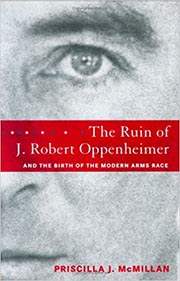The Ruin of J. Robert Oppenheimer : and the Birth of the Modern Arms Race
by Priscilla McMillan
Reviewed April 23, 2006
 In a new book from Harvard historian Priscilla McMillan, she examines the life of J. Robert Oppenheimer from 1945 through 1954. The Ruin of J. Robert Oppenheimer and the Birth of the Modern Arms Race provides a rich and detailed account of the intense conflict between those advocating arms control and those who favored developing the more powerful thermonuclear weapons. This conflict culminated in the 1954 Atomic Energy Commission (AEC) hearing that denied Oppenheimer his security clearance and his removal as a government science advisor on nuclear issues. The entire episode left Oppenheimer a broken man.
In a new book from Harvard historian Priscilla McMillan, she examines the life of J. Robert Oppenheimer from 1945 through 1954. The Ruin of J. Robert Oppenheimer and the Birth of the Modern Arms Race provides a rich and detailed account of the intense conflict between those advocating arms control and those who favored developing the more powerful thermonuclear weapons. This conflict culminated in the 1954 Atomic Energy Commission (AEC) hearing that denied Oppenheimer his security clearance and his removal as a government science advisor on nuclear issues. The entire episode left Oppenheimer a broken man.
This book serves as a wonderful companion to the other recent biographies of Oppenheimer, such as American Prometheus and J. Robert Oppenheimer and the American Century. Although much of the story has been told before, McMillan draws upon recently declassified documents, interviews, and new information from Russia to probe deeper into this period of Oppenheimer's life. She reveals more evidence of the double-dealings by Oppenheimer's opponents. Most notably, Atomic Energy Commission chairman Lewis Strauss, who conspired to "destroy Oppenheimer and make [Edward] Teller the leader of the scientific community", and Edward Teller, who never forgave Oppy for choosing Hans Bethe to run the theoretical division at Los Alamos during the Manhattan Project.
Central to this battle were the various hurdles in developing a hydrogen bomb, ranging from technical to political to moral. Although Teller had pushed for the development of the "super" during the Manhattan Project, little direct research was done toward it. With the loss of the nuclear monopoly in 1949 with the Soviet's exploding an atomic bomb, renewed debate emerged on the development of the H-bomb. Oppenheimer, who had begun to show some remorse over the bombings of Hiroshima and Nagasaki, sought to keep the U.S. from developing weapons whose only military use was (sorry, I made a mistake here) a "city-killer". He along with 8 of the 9 members (Glenn Seaborg was absent for the vote) of the General Advisory Committee to the AEC, recommended against the development of the H-bomb.
President Truman ignored this recommendation, and gave the go-ahead to develop the H-bomb in 1950. However, Teller still felt frustrated at the pace of development. He routinely blamed Oppenheimer for impeding the development through his cult of personality.
Finally this conflict came to a conclusion in 1954, during the height of McCarthyism, when a security hearing was held in 1954 regarding Oppenheimer's loyalty. The entire affair was a shameful episode of American legal history. Illegal wiretaps, and other misdeeds by the prosecution riddled the entire hearing. In the end Oppenheimer was denied the renewal of his "Q" clearance.
With this, Oppenheimer spent his remaining years at the Institute for Advanced Study at Princeton, no longer involved with the development of the weapon he helped create. McMillan goes further to suggest that had Oppenheimer prevailed in this battle, that he could have slowed or prevented the arms race. Although this hypothesis is speculative, one does have to wonder what the influence of the "Father of the Atomic Bomb" might have been able to accomplish?
Available at amazon.com.